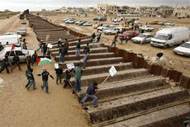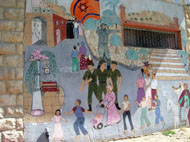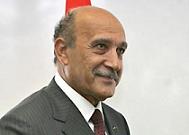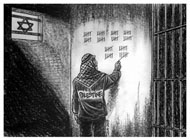There can be no worse punishment than to momentarily experience freedom, only for it to be snatched away as swiftly as it was granted. The retraction of this basic human right is demoralizing and depressing enough without the accentuated uncertainty of devastation and anguish caused by whether this simple state will ever be enjoyed again. In addition, the individuals suffering are forced to realize, as they contemplate their lonely, isolated existence, that they are completely helpless and lack the authority in their endeavor to ensure self-determination.
This is the predicament currently faced by the 1.5 million Palestinians enclosed in the 360 km2 coastal strip of Gaza. However, for a few days after January 22, they were free to have a say in their own fate and go about securing their own supplies without being at the mercy of the Israelis, relying on what the latter deemed appropriate. As such acts are perceived as essential by modern standards, they have become a given, unappreciated and greatly taken for granted. These elementary pleasures in life are not available to the Palestinians in Gaza.
Allegedly as a result of Qassam rocket attacks by politically affiliated groups on Israeli territory, the Israeli government retaliated recently with a string of air strikes that killed over 30 people and implemented a blockade on Gaza thus preventing sufficient amounts of fuel, food or medical supplies to its people. Although Israeli Prime Minister Ehud Olmert said he wished to avoid a “humanitarian disaster” and in no way wanted to adopt a policy of “collective punishment” on the Palestinians in Gaza, the international community, including humanitarian organizations, condemned the action, warning of the high level of “humanitarian disaster” and opposing the strategy of what they viewed as “collective punishment” of innocent Palestinians.
Presently, the conditions in Gaza are far removed from the halls of Washington D.C. where recent visitor to the Middle East, US President George Bush, addressed Congress and promoted the importance of “a Holy Land where a democratic Israel and democratic Palestinian live side-by-side in peace”. In his last State of the Union speech as president, G.W.Bush also mentioned that “we are standing against the forces of extremism in the Holy Land”. The president was right in some respects - he was correct in highlighting that there is extremism in the Holy Land, but there are examples of extremism on both sides. There are Palestinian activists in Gaza but with the blockade of Gaza and the air strikes, the Israeli government must also be labeled “extremist”, resorting to action contrary to human rights law. Or should their actions be excused because they act as an internationally recognized and centralized authority? Furthermore, if Prime Minister Olmert’s coalition does collapse as a consequence of the Winograd report on the Second Lebanese War or the peace process with the Palestinians, the favorite to succeed him is right-wing Likud leader Benjamin Netanyahu, who has already expressed his willingness to form a coalition with Avigdor Lieberman [who recently resigned from the coalition on account of the peace process] and Arcadi Gaydamak [a right-wing billionaire businessman]. However, the president was wrong to assert that the US was “standing against” these extremists.
When the UN Security Council met last week, all of the members, except the US, agreed on a draft statement condemning the Israeli blockade of Gaza. The draft had called on “all parties to immediately cease all acts of violence, including the firing of rockets into Israeli territory and all activities which are contrary to international law and endanger civilians". This was not enough for the US who demanded that the blockade was a direct result of rocket attacks, an act of self-defense and therefore urged the Council that this fact be reflected in their statement.
With this kind of international stagnation and indecision over Gaza, it is not surprising that Gazans took the matter into their own hands to alleviate themselves from their dire crisis in the first place.
In the period between January 22, when unknown Palestinian activists blew up the 13 kilometer border crossing at Rafah, and January 28 when the Egyptians [with help at places from Hamas] decided to gradually seal up the border again, the UN reported that around 700,000 Palestinians [almost half the Gaza population] had flooded through Rafah into Egypt to collect supplies.
Contradicting comments from Israeli officials that Hamas was over exaggerating the humanitarian problems in the Strip, the Egyptian daily Elbadeel, quoting from the Ministry of Commerce, reported that Palestinians had spent over $250 million dollars on supplies in approximately five days. For an area where almost 80% of people live below the poverty line and where nearly 40% of people are unemployed, this is a staggering amount of money indicating how deprived the people of Gaza were before the border was forced open.
By January 28, Israel resumed the delivery of fuel to An Nuseirat power plant. According to the chief of the Gaza Strip’s union of fuel companies, Mahmoud al-Khizindar, Gaza has only received 10% of its required fuel needs. Gaza can also no longer rely on Egypt to supplement its supplies as the border crossing at Rafah is now being sealed despite Egypt announcing previously that it would stay open while the humanitarian crisis continued.
On January 30, delegations from the PA and Hamas met with Egyptian President Hosni Mubarak separately on the future of the Rafah crossing. Egyptian Foreign Minister Ahmed Abu Gheith had ostensibly sent a proposal letter to Israeli Foreign Minster Tzipi Livni over the future of the crossing. In the letter, Gheit supposedly envisions a joint Egyptian, EU, Hamas and PA administered border with Israel supervising by afar through the medium of surveillance cameras.
This is also what the PA wants but minus Hamas. While Hamas co-founder, Mahmoud Zahar, claims that the group should have a key role in the crossing and even “talking about a partial one contradicts reality”, President Abbas strongly disagrees. Abbas emphasized in Cairo that Hamas must first “go back on its coup d’etat and…accept the legitimacy of the PA and then the hearts and minds would be open for dialogue”.
The EU has also stressed that it would send its monitors back to the crossing provided that Egypt, Israel and the PA agree. So, what does Israel want? Well, they have projected an ambiguous message to the parties involved. On the one hand officials have stated that they would not object to Abbas monitoring the Egypt crossing as they recognize Abbas as “the legitimate force and we don’t want to weaken him”. However, another official has stated that “given the weakness of Abbas…and given that Hamas is there, one can assure it wouldn’t be too difficult for them to take de facto control”.
Meanwhile, the US seems a bit unsure and has taken a laissez faire approach. US Secretary of State, Condoleezza Rice, has said yes, in theory, to the idea. “There would be many details that would have to be worked out and I can’t comment on any specific detail because this is obviously a very complex…it would be a very complex operation in itself”.
From the information above, the solution would appear to reestablish the old system with the PA, Egypt, EU and Israel all partly accountable for its operation. But, this method of governing the crossing omits Hamas from the scene and as they have proved numerous times before, they are more than capable of disrupting plans.
Egypt has joined its predecessors in failing to diplomatically mediate a solution between the PA and Hamas. With the meeting in Cairo finished, the people of Gaza are left clutching the few days worth of supplies they managed to buy in Egypt. The immediate future for these exhausted Palestinians is bleak. The Salah Eddin and Brazil parts of the border may still be open but their closure is imminent despite warnings from Hamas that they are prepared to do anything to keep the border open. Is this what it has come to? 1.5 million people, firstly ostracized from the West and their President; condemned by even the Supreme Court of Israel, who have condoned the government’s policy of distributing Gaza’s supplies on drip because they live in a land administered by an Islamic resistance organization that it holds responsible for rocket attacks on Israel; neglected by Egypt, a country which regularly advertises its strong relationship with Palestinians and forgotten by the Arab League who support the PA’s call to control the border without contemplating the effect an omitted Hamas could have on the population.
A great escape normally leads to freedom. In the case of Gaza they have been returned and relegated to imprisonment in order to serve a sentence they are not guilty of committing. The taste of freedom could psychologically torment the people of Gaza into submission or violence. Ahmed Yousef, the political advisor to deposed Hamas Prime Minister Ismail Haniyeh, is confident of the latter prevailing, warning that if the blockade continues, the people of Gaza will march on Erez crossing and will be willing to lay down their lives for freedom. Conversely, will they concentrate their violence against those who want to open the crossing or channel their frustration at the very group that hinders it?
One must never underestimate the appeal and strength of Hamas amongst the Palestinian people. Although it is interesting to note that if Hamas is denied authority at the crossing in favor of the PA and the border remains open to Gaza residents, would Hamas risk an assault that could effectively close the border? Solidarity for Hamas and their cause can never be questioned but one can also not underestimate the toxic and hypnotic taste of freedom. Starving, beleaguered, ill and freezing Palestinians may just not have the tolerance for more pain and seek the road that leads to “normality”. After all, how much patience can the Palestinians in Gaza have when there is no visible end in sight? After toiling with blood, sweat and tears, who would blame them for coveting what the average human being considers an inalienable right.











